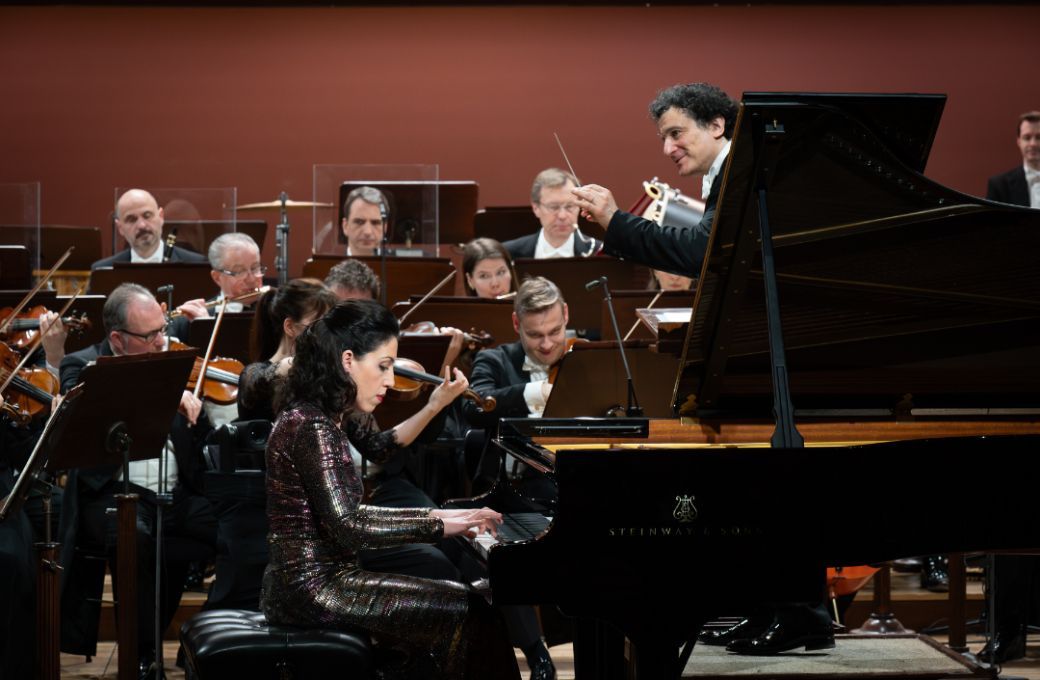French music being scarce in Prague, it’s always a treat to see Alain Altinoglu taking the podium for a guest appearance with the Czech Philharmonic. On this visit he brought a handful of Franco favorites and lush accompaniment for a star soloist, pianist Beatrice Rana.

Rana’s mesmerizing performance of Mendelssohn’s Piano Concerto no. 1 in G minor was the highlight of the evening. After her dazzling showing at the 2019 Firkušný Festival, local audiences were primed for her debut with the country’s flagship orchestra, and were not disappointed. Rana played with the remarkable sophistication that always leaves viewers marveling at how someone so young can be so accomplished, combining absolute command of the material with a sensitive style that held the hall spellbound.
Her technique was a study in contrasts – bold attacks in the complicated runs, fingers flying up and down the keyboard, and a touch so soft in the pianissimo solos that the notes were like delicate pins dropping, especially in the second movement. Watching Rana play is magical at times. Her fingers seem to dance across the keys, never landing too hard or deep, yet her power can be intense and and her interpretation rings with authority. The superb control she showed throughout came to the fore in the final movement, as she snapped off lines in the rambunctious Rondo.
The final movement also showcased a particularly neat fit between soloist and orchestra. Typically, guest artists run on parallel tracks, performing with individual expertise that may or may not lock into a common approach. Altinoglu and Rana share a similar style – graceful yet powerful – that gave this piece an organic sound and compelling momentum. It’s rare to see such a tight performance, especially with a soloist who is playing with an orchestra for the first time. But this one flowed very naturally, not in the least bit strained or ragged, a smart, smooth collaboration that left even the orchestra musicians applauding. And two encores of Mendelssohn’s Songs Without Words put a luminous finish on Rana’s appearance.
Altinoglu got the evening off to an energetic start with a lively rendition of Berlioz’s Le Carnaval romain overture. After a shimmering opening and a fine turn on the cor anglais from Vladislav Borovka, the conductor scattered splashes of color and invoked whirling dances as he built to a full-blooded treatment of the love theme, finishing with a thrilling reprise of the carnival scene. Most impressive was Altinoglu’s fingertip control of the sound, carefully calibrated dynamics executed with admirable finesse.
The second half of the program lacked some of that spark. Berlioz’s Chasse royale et orage (from Les Troyens) featured bright brass and notable work in the horns, but started in a muted mode and took some time to develop atmospherics and spirit. The best moment may have been the ending, an expertly crafted, hold-your-breath fadeout. Ravel’s Second Suite from Daphnis and Chloé was in much the same mode, with superb work in the woodwinds offering colorful high spots amid an impressionistic, almost dreamlike treatment. Again, the piece took on verve and impact as it developed, in an expanding series of blossoming phrases that reached towering heights. But the build-up to a thunderous finish suggested that more energy earlier in the reading would have added some missing vitality.
Still, one could hardly ask for a better artistic pairing. And from the orchestra, another demonstration that while its Czech roots run deep, it is at heart a highly versatile ensemble.


